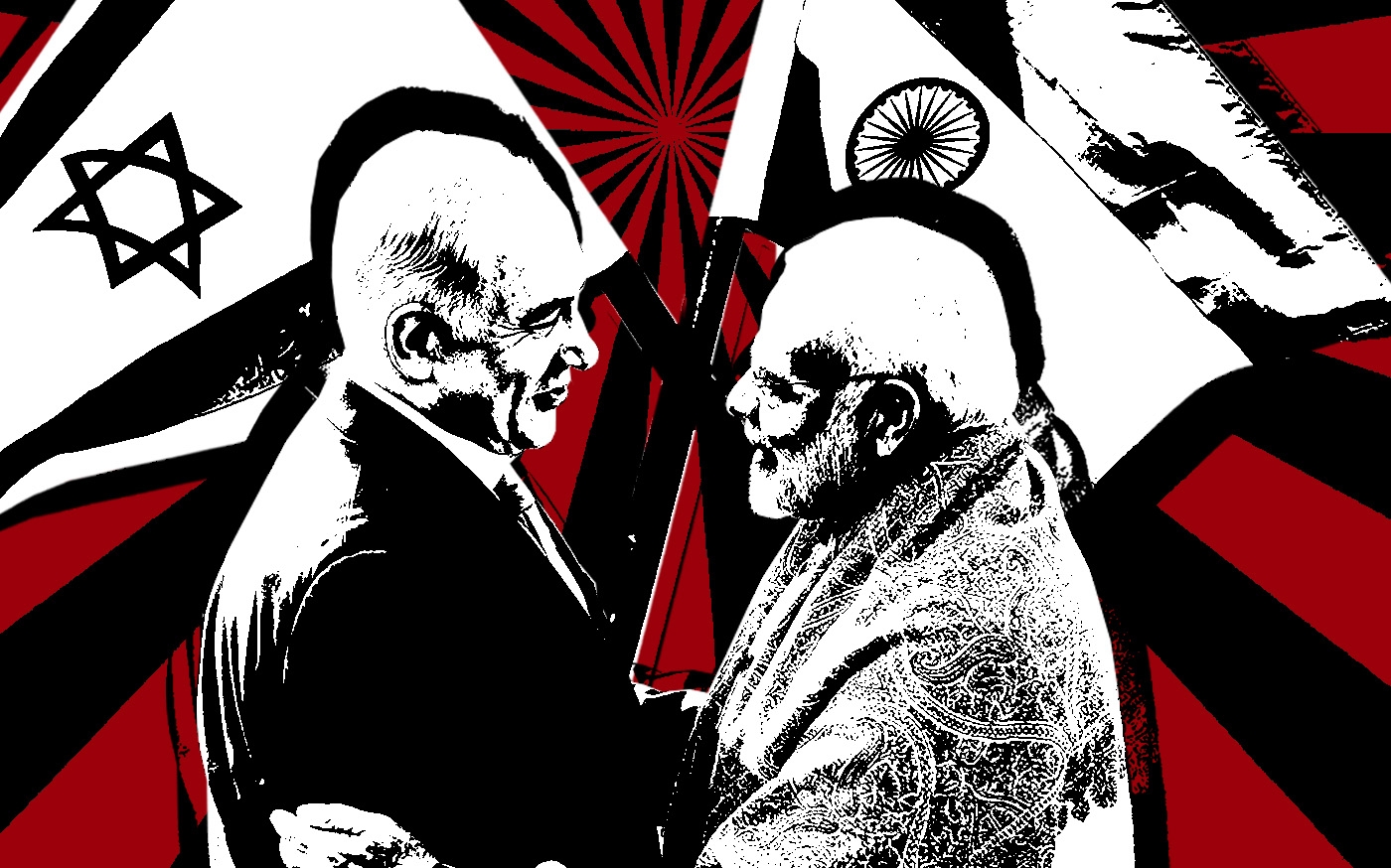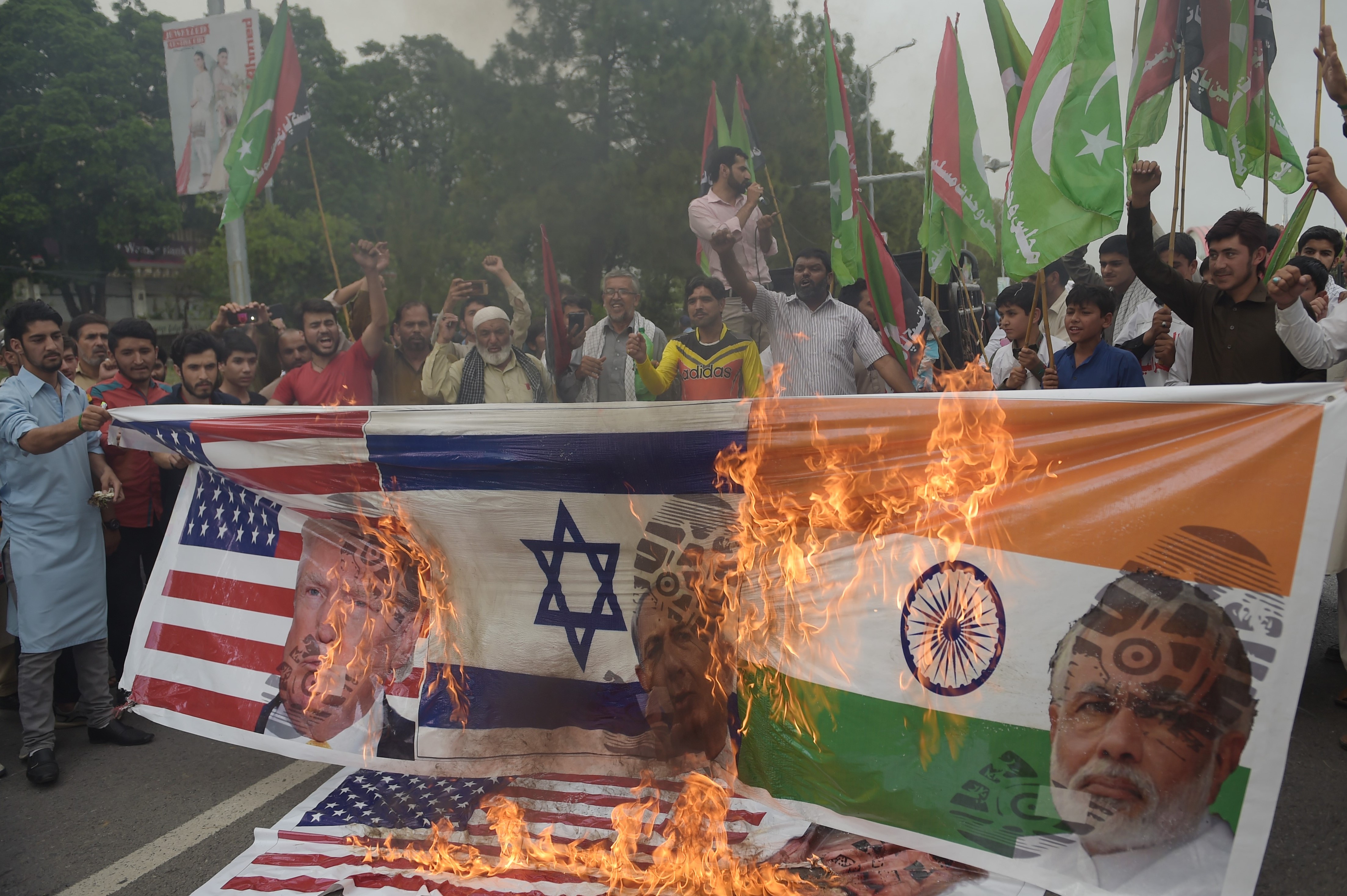India once called Zionism racist. Today it moves to replicate it
5 September 2019 10:41 UTC
Both Hindutva, the Hindu nationalistic agenda, and Zionism share a common ambition to build supremacist democratic states with a single culture, a single race and a single nation

In the winter of 1975, the United Nations passed resolution 3379 stating that "Zonism is a form of racism and racial discrimination".
UN resolution 3379 made reference to a resolution adopted three months earlier by the Organization of African Unity (now the African Union), that drew comparisons between the racist and colonial projects in South Africa and Israel.
“The racist regime in occupied Palestine and the racist regime in Zimbabwe and South Africa have a common imperialist origin, forming a whole and having the same racist structure and being organically linked in their policy aimed at repression of the dignity and integrity of the human being,” the OAU resolution 77 (XII) read.
A landmark resolution
India was one of 72 nations, mostly former colonies, that brought life to a landmark resolution that found Zionism to be a fundamentally exclusionist ideology, responsible for the demarcation of Palestinians as second-class citizens.
At the time, India was part of the Non-Aligned Movement during the Cold War, playing a trailblazing role in the isolation of Israel’s close collaborator, South Africa.
India was one of 72 nations that brought life to a landmark resolution that found Zionism to be a fundamentally exclusionist ideology
Sixteen years later, the Cold War would be over, and the world was a different place.
In 1991, Israel made the revocation of Zionism-as-racism a precondition for its participation at the Madrid Peace Conference held the same year, thus forcing the UN to hold a new vote. Resolution 3379 was repealed. India voted for its revocation, too.
The establishment of full diplomatic relations between India and Israel followed in 1992. The liberalisation of India’s economy led to shifts in its foreign policy and a rewiring of its priorities on the global stage.
India also began pursuing closer ties with Israel, independent of their commitment to the Palestinian peace process, while New Delhi's voting patterns on the peace process remained unchanged at the UN.
But whereas it had once considered Zionism, the ideology that underpins the establishment of the state of Israel, as a type of racism, the further alignment of India and Israel's defence concerns, especially in lieu of the US "war on terror", saw its solidarity with the Palestinians in the 2000s gradually dilute to one of lip service and a politics of respectability.
And then came Narendra Modi.
The rise of Hindutva
In 2014, the Hindu-nationalist politician became India’s new prime minister.
As a life-long member of the right-wing Rashtriya Swayamsevak Sangh (RSS) group, that had long-held ambitions to turn India into a Hindu Rashtra, or a Hindu state, Modi has brought the process of reshaping India in the image of its majority right to the highest level of the state.
Under Modi, a country that once held Zionism to be racism, no longer has an interest in keeping up the facade of a solidarity with the Palestinian
It is the RSS which gave birth to Hindutva, the Hindu nationalistic agenda at the heart of Modi’s India. Hindutva has little to do with the practices or beliefs of Hinduism itself.
And though the RSS found its inspiration in Adolf Hiter and the "cultural nationalism” and “race pride” of Nazism, Modi and Netanyahu quickly bonded in 2014 over their zealous objective to consolidate total and absolute power over their territories.
They also recognised in each other the similarity of their ambitions to build supremacist democratic states with a single culture, a single race and a single nation.
The relationship immediately translated into technological and agricultural exchange and new partnerships. Though India has been purchasing arms from Israel for close to two decades, under Modi, India purchased 46 percent of all arms sold by Israel. Israel is now India’s largest arms supplier, with an estimated $1bn worth of military sales per year.

Apoorva PG, South Asia coordinator for the Boycott Divestment and Sanctions Campaign (BDS), told Middle East Eye that India was now deeply “complicit in Israel’s regime of military occupation, settler colonialism, and apartheid”.
Modi’s visit to Israel in 2017, the first by a sitting Indian PM, put to rest any lingering doubts about his commitment to Israel. Netanyahu described the visit as "tearing down the final walls dividing our countries".
Since then, the connection between Hindutva and Zionism as kindred spirits has taken on a life of its own. For one, just as criticism of Israel and Zionism is conflated with anti-Semitism, proponents of Hindutva allege Hindu-phoba in the face of critique or condemnation of its ideology.
Gandhi and Israel
At an event on 26 August, and easily one of the first of its kind, organised by the Israeli consul-general in Mumbai in conjunction with the Indo-Israel Friendship Association, two ideologues celebrated the closeness between Hindutva and Zionism.
Whereas noted Zionist historian Gadi Taub, from the Hebrew University, regaled the crowd on the failures of multiculturalism and the need for a single national identity, Subramaniam Swamy, an MP with the ruling Bharatiya Janata Party (BJP), invoked Samuel Huntington’s "Clash of Civilisations" in explaining the need for Zionism and Hindutva to work against a common enemy.
Despite talk of equal citizenship, Indian Muslims and Christians cannot belong to “the Hindu race” and are under constant pressure to prove their “loyalty” to the Hindu state
“Zion is today under attack from Islamic extremists, and therefore both of us should come together to fight the Islamic terror forces,” Swamy said.
The closest Taub ventured into India's earlier politics - when the RSS was banned - was to say that “there is a lot to admire about [Mahatma] Gandhi and many Israelis do, but he was not a supporter of Zionism”.
That Taub would casually raise Gandhi - conveniently glazing over the fact he was killed by a Hindu nationalist from the RSS for refusing to adopt the very supremacist philosophies they had adopted from Nazism and today from Zionism - is itself an historical absurdity.
But what is fascism besides the blunting of reason?
Taub is certainly well aware that his country’s tiered citizenship has become the example Hindu nationalists wish to replicate. Just as non-Jews are scapegoated and treated as second-class citizens in Israel, and Palestinian history is appropriated and written out of text books, much of the same is underway in India.
Kashmir and Palestine
In India, despite talk of equal citizenship, Muslims and Christians cannot belong to “the Hindu race” and so they are under constant pressure to prove their “loyalty” to the Hindu state. Their history, too, is shameful and an aberration to Hindu India, culminating in changes to school text books and curriculums.
The historical revisionism, as many have pointed out, only advances the interests of the ruling party.
Even the annexation of Kashmir in early August is part of a promise made by the RSS to unify all of Hindu civilisation that, according to Hindutva, was quashed under the boots of outsiders, ie Muslims.
As Kapil Komireddi writes in The Washington Post, Modi’s action in Kashmir was a message to all that “no one is exempt from the Hindu-power paradise he wants to build on the subcontinent. Kashmir is both a warning and a template: any state that deviates from this vision can be brought under Delhi’s thumb in the name of 'unity'."
And those deemed to be “imposters” can be ruled as anti-nationals or simply erased. Last week, more than 1.9 million people, mainly Muslims, were stripped of the citizenship in the north-east state of Assam. In a flash, they became stateless.
Under Modi, India - a country that once held Zionism to be racism - no longer has an interest in keeping up the facade of solidarity with the Palestinians. India is now led by a man and an organisation that fantasise of turning the country into Israel.
The views expressed in this article belong to the author and do not necessarily reflect the editorial policy of Middle East Eye.
Illustration by Mohamad Elaasar.


0 Comments:
Post a Comment
Subscribe to Post Comments [Atom]
<< Home